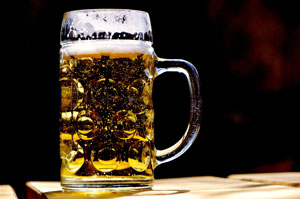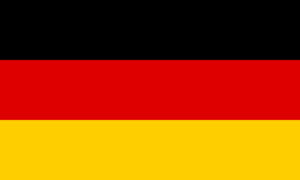Beer is a significant part of German culture. German beer is brewed according to the Reinheitsgebot, which permits only water, hops, and malt as ingredients and stipulates that beers not exclusively using barley-malt such as wheat beer must be top-fermented.
In fact in the old days beer was even used to pay workers. German beer is known around the world as a product of high quality as it represents consistency, continuity, and a fiercely protected tradition.
ドイツビールについて

German Beer Introduction
ドイツビールの紹介



Unique Characteristics
ユニークな特性
Thanks to that the 1487 German Purity Law (Reinheitsgebot), German beer can only be made of the following ingredients – water, hops and malt, and since a change in the law in 1933, now also yeast. German beer drinkers don’t fret about the strict governance of these ingredience as they know their beers are not mundane. German beer has many different tastes and aromas due to the variety of yeast and bacteria used during brewing. There are 5000 different types of German beer which are made by more than 1300 breweries. So it might take you some time to sample them all!


German Beer History
ドイツビールの歴史
The Reinheitsgebot ("purity decree"), sometimes called the "German Beer Purity Law" or the "Bavarian Purity Law" in English, was a regulation concerning the production of beer in Germany.
In the original text, the only ingredients that could be used in the production of beer were water, barley, and hops, which had to be added only while the wort was boiling. After its discovery, yeast became the fourth legal ingredient. (For top fermenting beers, the use of sugar is also permitted.)
There is a dispute as to where the Reinheitsgebot originated. Some Bavarians point out that the law originated in the city of Ingolstadt in the duchy of Bavaria on 23 April 1516, although first put forward in 1487,[4] concerning standards for the sale and composition of beer.
Thuringians point to a document which states the ingredients of beer as water, hops, and barley only, and was written in 1434 in Weißensee (Thuringia). It was discovered in the medieval Runneburg near Erfurt in 1999.[5] Before its official repeal in 1987, it was the oldest food-quality regulation in the world.[6]

German Beer Terroir
ドイツビール地方


The area of the country somewhat defines or dictates which type of beer is brewed and every major city, large town and even smaller villages will boast at least one local brewery. When traveling from north to south you will find beers to be “maltier” and they are “hoppier” while traveling in a reverse direction.
Approximately half of all German breweries are in Bavaria as well as this southernmost state has the greatest variety of beer styles. Here beers vary in shades of color and strength, from very blond to black lagers and pale to brown wheat ales as well as clear and yeast-turbid to pale and brown wheat ales. The most popular beer style east of Bavaria is the Pilsner or the modern lager.
The traditional German ale can be found in the Rhineland area while the blond lager is popular in the Westphalia area. The northern regions have the dry and hoppy Pils and a light wheat beer.
Beer Festivals and Travel Info
フェスティバルと旅行情報


Oktoberfest is a 16- to 18-day festival held annually in Munich, Bavaria, Germany, running from late September to the first weekend in October. Only beer which is brewed within the city limits of Munich with a minimum of 13.5% Stammwürze (approximately 6% alcohol by volume) is allowed to be served in this festival. Upon passing this criterion, a beer is designated Oktoberfest Beer. Large quantities of German beer are consumed, with almost 7 million liters served during the 16-day festival in 2007. Recently in 2015 the festival officially served 7.3 million liters of beer.[23]
Popular Beer Styles & Terms
人気なビールスタイルと言葉
Germans definitely know their beer styles. Often when a German orders a beer, he or she asks for a specific style instead of a brand. For example, someone will ask for a Pils (pale beer/lager) instead of an Paulaner (a brand). Styles vary in shades of color and strength. Styles can be blond to almost black lagers, clear to yeast turbid as well as pale to brown ales.
ビールスタイル

Wheat Beer
Wheat Beers, also known as ales, are probably the most famous of German beers. These beers are mainly brewed with wheat malt or malted barley. They are called Weizen in Baden-Württemberg and Weissbier or Weisse in Bavaria and northern regions.
For more info, please visit our Wheat Beers Page.

Pilsner (Lager) Beer
Examples of pales include Altbier, Export, Pilsner, Helles and Kölsch. The Pale (lager) beer is the most common style of beer in the U.S. These pale to golden-colored beers tend to be dry, lean, clean-tasting and crisp. Pale beers are fermented at warmer temperatures with air-contact and stored for no more than a couple of days up to a couple of weeks, but at a normal temperature, not chilled. The flavors and aromas often resemble those of apple, pear, pineapple, grass, hay, banana, plum or prune.
For more info, please visit our Pilsners or Lagers Page.

Dark Beers
Wheat Beers, also known as ales, are probably the most famous of German beers. These beers are mainly brewed with wheat malt or malted barley. They are called Weizen in Baden-Württemberg and Weissbier or Weisse in Bavaria and northern regions.
For more info, please visit our Dark Beers Page.

Unfiltered Beers
These Kellerbiers (Cellar beers) are unfiltered lagers, similar to cask ales. Recipes date back to the middle ages and tend to contain more of the original brewing yeast. Strength and color varies from region to region, but generally they are a deep amber in color but almost always cloudy as they are not filtered or pasteurised. Many Kellerbiers are produced in limited editions for special occasions such as Christmas and New Year and served directly from the barrel.
Popular Breweries
人気のある醸造所

クロンバッハ ヴァイツェン
エールの本場英国産のモルト、ホップをふんだんに使い、古式醸造法で仕込みました。アロマホップの華やかな香りが特徴的。

パウラーナー
西オーストラリアのフリーマントルならではのクリエイティブで自由な思想を基に、ホッピーなビールに心を奪われたビール愛好家達によって造られたリトルクリーチャーズは、作り手の独創性と個性に心を揺さぶられたことで、フレーバーを大切にし、独特でバランスの良いビールを醸造する事に取り組んでいます。オーストラリアをリードする醸造所です。